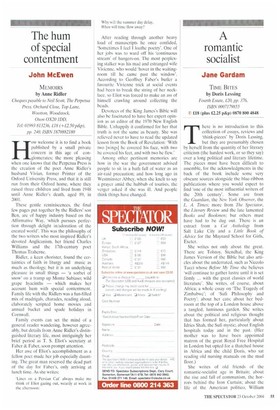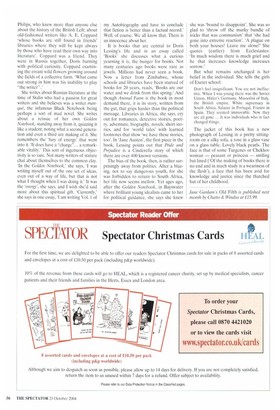romantic socialist
Jane Gardam
TIME BITES by Doris Lessing Fourth Estate, 120, pp, 376, ISBN 0007179855 £18 (plus £2.25 p&p) 0870 800 4848 There is no introduction to this collection of essays, reviews and 'think-pieces' by Doris Lessing, but they are presumably chosen by herself from the quantity of her literary criticism (the hardest work, or so they say) over a long political and literary lifetime. The pieces must have been difficult to assemble, for the acknowledgments in the back of the book include some very obscure sources alongside the blue-ribbon publications where you would expect to find 'one of the most influential writers of the 20th century'. Some are from the Guardian, the New York Observer, the L. A. Times; more from The Spectator, the Literary Review and the late lamented Books and Bookmen; but others must have had to be dug out. There is an extract from a Cat Anthology from Salt Lake City and a Little Book of Advice for the Maynard School for Girls, Exeter.
She writes not only about the great. There are Tolstoy, Stendhal, the King James Version of the Bible but also articles about the underrated, such as Niccolo Toed whose Before My Time she believes 'will continue to gather lustre until it is set firmly ... with the great classics of world literature'. She writes, of course, about Africa; a whole essay on 'The Tragedy of Zimbabwe'; of 'Sufi Philosophy and Poetry'; about her cats; about her bedroom at the top of a London house above a tangled, luminous garden. She writes about the political and religious thought that has formed her, particularly about Idries Shah, the Sufi mystic; about English hospitals today and in the past. (Her mother was to have been appointed matron of the great Royal Free Hospital in London but opted for a thatched house in Africa and the child Doris, who sat reading old nursing manuals on the mud floor.)
She writes of old friends of the romantic-socialist age in Britain; about the rise and fall of communism, the horrors behind the Iron Curtain; about the life of the American politico, William Philips, who knew more than anyone else about the history of the British Left; about old-fashioned writers like A. E. Coppard 'whose books are still found in friends' libraries where they will be kept always by those who have read their own way into literature'. Coppard was a friend. They were in Russia together, Doris burning with political curiosity, Coppard examining the errant wild flowers growing around the fields of a collective farm. 'What came out strong in him was his inability to play "the writer" .'
She writes about Russian literature at the time of Stalin who had a passion for great writers and she believes was a writer manqué, the infamous Black Notebook being perhaps a sort of mad novel. She writes about a reissue of her own Golden Notebook, standing away from it, quizzing it like a student, noting what a second generation and even a third are making of it. She remembers the 'fury of energy' that went into it. 'It does have a "charge"... a remarkable vitality.' This sort of ingenuous objectivity is so rare. Not many writers of stature chat about themselves to the common clay. 'In the Golden Notebook,' she says, 'I was writing myself out of the one set of ideas, even out of a way of life, but that is not what I thought when I was doing it.' It was the 'energy', she says, and I wish she'd said more about this spiritual gift. 'Currently,' she says in one essay, 'I am writing Vol. 1 of
my Autobiography and have to conclude that fiction is better than a factual record.' Well, of course. We all know that. There is an innocence about her.
It is books that are central to Doris Lessing's life and in an essay called 'Books' she discusses what a curious yearning it is, the hunger for books. Not many centuries ago books were rare as jewels. Millions had never seen a book. Now a letter from Zimbabwe, whose schools and libraries have been starved of books for 20 years, reads, 'Books are our water and we drink from this spring.' And though Animal Farm is the book in most demand there, it is its story, written from the gut, that grips harder than the political message. Libraries in Africa, she says, cry Out for romances, detective stories, poetry, adventure, biography, novels, short stories, and for 'world tales' with learned footnotes that show 'we have these stories, too'. In 'Jane Austen', the first piece in the book, Lessing points out that Pride and Prejudice is a Cinderella story of which there are over 400 known versions.
The bias of the book, then, is rather surprisingly away from politics. After a blazing, not to say dangerous youth, for she was forbidden to return to South Africa, her life now seems mellow. Yet ages ago, after the Golden Notebook, in Bayswater where brilliant young idealists came to her for political guidance, she says she knew she was 'bound to disappoint'. She was so glad to 'throw off the murky bundle of tricks that was communism' that 'she had gone into extreme reaction'. 'A plague on both your houses! Leave me alone!' She quotes (earlier) from Ecclesiastes: 'In much wisdom there is much grief and he that increases knowledge increases sorrow.'
But what remains unchanged is her belief in the individual. She tells the girls of Exeter school:
Don't feet insignificant. You are not ineffective. When I was young there was the Soviet Union, Hitler's Germany, Mussolini of Italy, the British empire, White supremacy in South Africa, Salazar in Portugal, Franco in Spain. They seemed immovable. Now they are all gone It was individuals who in fact changed things.
The jacket of this book has a new photograph of Lessing in a pretty sittingroom on a silky sofa, a rose in a glass vase on a glass table. Lovely black pearls. The face is that of some Turgenev or Chekhov woman — peasant or princess smiling but lined ('Of the making of books there is no end and in much study is a weariness of the flesh'), a face that has been avid for knowledge and justice since the thatched hut of her childhood.

























































































 Previous page
Previous page